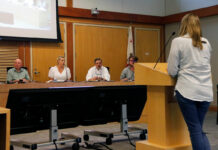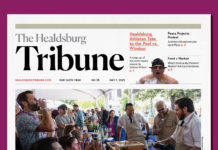The Pilgrims of the Plymouth Colony celebrated their first
Thanksgiving in 1621 after harvesting an ample supply of foods and
grain to survive the approaching harsh winter of New England. This
had followed two previous winters of disease, lack of shelter and
the deaths of all but four of the colony’s 18 women.
The Pilgrim’s first Thanksgiving lasted three days and included
feasting on wild turkeys, waterfowl and fish.
If these Pilgrims praised and thanked God for mere survival and
the prospect of enduring another long and freezing New England
winter, how grateful and full of thanks should we be?
We live in one of the most beautiful and bountiful places on all
of Earth. Nature’s gifts here are boundless, even now after almost
200 years of Russian, European and Spanish settlements. We are
blessed with the supreme “gift of good land.”
Besides giving thanks for our lucky pedigree, we should deepen
our commitments to being the best stewards possible of these
god-given treasures. Call it Wine Country, the Redwood Empire or
just Sonoma. We live in an amazing place that is both warmed and
cooled by Pacific Ocean currents. Prehistoric redwood trees grow to
300 feet to reach winter’s ocean breezes and summer’s fog. Deep and
rich volcanic soils flatten out over our river valley and wide
alluvial plains where hops, plums, berries and now grapes flourish.
Farming here is not what the Plymouth Pilgrims experienced.
The earliest people, the Pomo Indians, celebrated this region’s
natural gifts and bounty every day. They roamed the river valleys,
ocean coast and deep redwood forests as the seasons changed and the
living animals and plants moved and changed with them. They ate
salmon from the rivers, shellfish from the sea and made meals and
food supplies from the native plants, oaks and berries. The Pomos
were Sonoma County’s original sustainable culture, harvesting only
what they needed and making their thanksgivings to nature, healing
spirits, and to the Coyote as their creator God.
Between the somber determination of the Plymouth Pilgrims and
the nomadic and gentle culture of the Pomos comes us. Like most
things, we have convinced ourselves that we invented Thanksgiving.
We claim to have originated the concept of sustainability. And, we
have determined to “improve” this gift of land and great bounty
with our machines, our perseverance and our superiority.
To our credit and for our heritage, we have done many good
things with these natural gifts of nature, place and climate. We
have been mostly reverent, while we also have been reckless at
times.
For this Thanksgiving, let us praise the gift of good soil,
water and climate — the prayers a modest country farmer would
offer. Let us lift our heads and gaze over the incredible natural
beauty of our cathedral-like redwood stands, our undeveloped ocean
coast, the oak forests and all the open (and protected)
hillsides.
Our reward for being good land stewards will be spread across
our Thanksgiving tables this year.
We don’t shoot our local wild turkeys like the Pilgrims did; we
have Willie Bird and other heritage bird farms here. Most of our
Thanksgiving tables also will have the early season’s catch of
local Dungeness crabs.
All of our vegetables and fruits are grown by us or our
neighbors. We select them from the seasonal farmers’ markets, farm
visits or at our selection of great locally-owned grocery stores.
Our apple and pumpkin pies will be made within view of the trees
and gardens from where they were grown. Fresh, whole and
delicious.
Sonoma County’s breads and cheeses will be served on many
holiday tables across the country because we have enough to
share.
And, also on this Thanksgiving, like so many that have come
before, we will offer our blessings and make toasts with the
greatest wines in the world — our own.
Bless our good land.
— Rollie Atkinson








